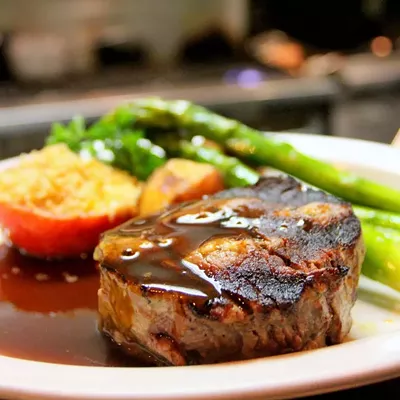Born in 1950 and a former editor at, of all things, Foreign Affairs, Ives specializes in bizarre little comedies that can tickle, enchant and perplex an audience in all of 10 or 15 minutes. One of his more epic works is about mayflies, which live only a single day.
Four short plays by Ives hold the stage at Wilde Playhouse under the title Behold the Sacred Potato. Some of this material initially seems amusing but inconsequential, although it's the sort of stuff that sticks in your head long after you've left the theater. The glory of Ives' work is that you can read as much as you want into it--or nothing at all. Now, that's entertainment.
Ives makes overt musical references in much of his other work (but not in the four plays at hand), so it's not inappropriate to think of his little plays as bagatelles: seeming trifles that easily hold your attention, and sometimes revealing greater substance than you'd expect.
The music that came to mind on opening night, however, was John Cage's 4'33''; at the appointed hour, the house lights went black, but the audience sat in silent darkness waiting for something more to happen. As in the Cage "composition," the only sound and action for what seemed like way too many minutes came from audience members shifting in their seats, wondering if this was part of the show or just a mistake. Lighting and sound glitches also afflicted the final play on the ticket, but the cast managed to ad lib its way out of trouble, and everything in between went smoothly.
Once the stage lights finally came up, the scene was the vicinity of Nineveh, about 1000 B.C. Babel's in Arms (the apostrophe seems to have dropped off the printed program) gives us two workers (Mark Berry and Michael Pierce), who might be called "blue collar" if they weren't wearing togas, ordered to build a tower so that a consortium of self-important investors (represented by Linda Andresano) can go up and shake hands with God (or, more likely, spit in his eye). The undertaking is blessed by a high priestess (Sara Nixon-Kirschner) who brings new meaning to the adjective "high" (she chants "Oh wow, oh wow, oh wow"), assisted by a eunuch (Tony Eckstat) who pulls out of a strategically placed pouch the sacred potato of the evening's title.
In a quarter of an hour, we witness the origins of class struggle and religious strife, the rise of pantheism and pragmatism, and the development of this new invention called language (in ancient Nineveh, it seems that "fucker" was a synonym for "thing"). It's like a Monty Python production of Waiting for Godot in Southern California.
Language is poetic in its inadequacy in Arabian Nights, wherein an unreliable interpreter (Eckstat) helps negotiate an unusual transaction between an American tourist (John McRostie) and a Middle Eastern merchant (Kylie Arnold).
In the midst of Ives' parody and satire, incongruity and absurdity, Lives of the Saints seems a little out of place. Here, Beckett meets Tracey Ullman in a vignette about two elderly Polish-American ladies (Andresano, Nixon-Kirschner) preparing a funeral breakfast in the basement of their church. It's a charming, touching piece whose plotlessness may put off viewers who insist that something happen on stage.
A final bit of frivolity is The Mystery at Twicknam Vicarage, a send-up of British murder mysteries in which an investigator (Berry) questions three suspects (Nixon-Kirschner, Eckstat and Dana Cianciotto) in the murder of a sexual predator (Pierce) known to copulate even with the furniture.
Each little play falls under the purview of a different director: Joan O'Dwyer, Janet Lynn Henderson, Dana Cianciotto and Nick Cianciotto. Every vignette counts as a small success, with good camaraderie and fine comic timing across the cast; Berry and Pierce are especially fun in Babel's in Arms.
What this production lacks is simply another play or two by Ives to fill out the evening a little more. But that's the first rule of showbiz: Leave 'em wanting more.










